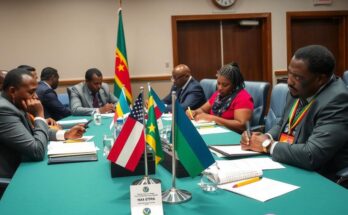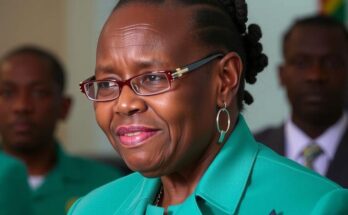Yamandú Orsi won a close presidential election in Uruguay, defeating Álvaro Delgado and marking a shift toward leftist governance. With over 49% of the votes, Orsi emphasized unity and dialogue in his victory speech after a high voter turnout. The election mirrors global trends in political change as citizens respond to economic challenges, eliciting significant support for Orsi, who promises moderate reforms and continued progressive policies.
In a closely contested runoff election, Yamandú Orsi, a left-wing opposition candidate, emerged victorious against the incumbent conservative coalition in Uruguay. His triumph signifies a significant shift in the leadership of the nation, with Orsi representing the Broad Front coalition, having previously served as a two-time mayor and a history teacher. The election highlighted widespread voter dissatisfaction with the current government amid ongoing post-pandemic economic challenges.
Álvaro Delgado, the candidate for the ruling centre-right coalition, conceded defeat as the voting count proceeded, expressing his sentiments, “With sadness, but without guilt, we can congratulate the winner,” to his supporters. Following the announcement of his win, Orsi addressed a euphoric crowd, stating, “The nation of liberty, equality and fraternity has triumphed once more,” and emphasized the need to unify the country’s citizens, acknowledging the narrow margin of victory.
The election saw Orsi garner over 49% of the votes while Delgado received approximately 46%, with a remarkable turnout of 90% due to Uruguay’s compulsory voting law. Despite an overall sense of discontent among the youth regarding political engagement, Orsi’s moderate campaigning approach differed from the populist sentiments observed in neighboring regions. Outgoing President Luis Lacalle Pou publicly recognized Orsi’s success, indicating a readiness for a smooth transition of power.
Orsi’s victory is indicative of a growing public desire for change, driven by economic pressures compounded by the pandemic. His political platform appears to merge market-friendly tactics with social welfare initiatives, reminiscent of the Broad Front’s previous governance from 2005 to 2020. This approach had historically facilitated economic growth and progressive reforms such as the legalization of same-sex marriage and abortion.
José “Pepe” Mujica, the former president and influential figure in the Broad Front movement, publicly endorsed Orsi, recognizing the significance of the electoral achievement for the nation’s political climate. Orsi has proposed targeted reforms aimed at invigorating investment and agricultural growth while promising a commitment to constructive dialogue with all sectors of society. His official term will commence on March 1, 2025, with observers keenly awaiting the re-examination of trade agreements within the Mercosur bloc, particularly regarding China.
Yamandú Orsi’s presidential victory in Uruguay is set against a backdrop of global electoral shifts toward leftist and opposition candidates. The election is a reflection of accumulated public discontent relating to economic hardships and slow recovery post-pandemic. The Broad Front coalition, to which Orsi belongs, has a legacy of significant social reforms and economic policies that have reshaped Uruguay in the past, contributing to its reputation as a progressive nation in South America. This electoral outcome is pivotal not just for Uruguay but signals broader trends affecting incumbents in various political landscapes worldwide.
The election of Yamandú Orsi represents a transformative moment for Uruguay, as his administration seeks to address citizens’ concerns and foster inclusivity. Orsi commits to uniting a divided nation while pursuing moderate reforms designed to stimulate economic recovery and social welfare. As the new government prepares for its inauguration in March 2025, many will be watching for effective policy implementations and the maintenance of Uruguay’s historical commitment to progressive values.
Original Source: indianexpress.com




